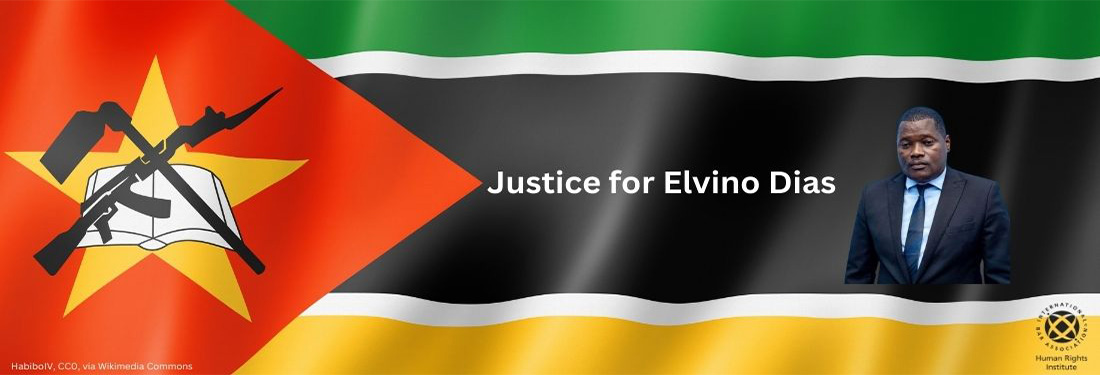IBAHRI condemns killing of lawyer Elvino Dias and calls for Mozambique to honour its international obligations

The International Bar Association’s Human Rights Institute (IBAHRI) has condemned the targeted killing of the prominent Mozambican lawyer Elvino Dias who was the legal advisor to opposition presidential candidate Venâncio Mondlane.
Mr Dias and Paulo Guambe, the election agent of the Podemos Party that supported Mr Mondlane’s presidential bid to challenge the almost 50-year rule of the Frelimo party, were shot dead in Mozambique’s capital city, Maputo on 19 October 2024. According to eyewitnesses the bodywork of the car in which they were travelling was riddled with bullet holes.
Anne Ramberg Dr Jur hc, IBAHRI Co-Chair and the Immediate Past Secretary General of the Swedish Bar Association, commented: ‘The IBAHRI condemns in the strongest terms the assassination of the lawyer Elvino Dias. Depriving Mr Dias of his precious life simply for his choice of profession and carrying out the associated duties is unconscionable. This is an attack not only on the individual but against the legal profession in Mozambique and the rule of law. It is a setback for access to justice in the country and democracy. Mr Dias’ murder may have a chilling effect on other legal professionals, dissuading them from taking on human rights and/or politically sensitive cases. Our condolences go to the families, friends and colleagues of the deceased as we stand with the country’s legal community.’
Ms Ramberg added: ‘The IBAHRI calls on the Mozambican government to honour its international obligations. Recalling Mozambique's commitment under the International Covenant on Civil and Political Rights (ICCPR), Article 6(i), it is stated that the right to life shall be protected by law and that no one shall be arbitrarily deprived of their life. The IBAHRI calls for competent national authorities in Mozambique, in collaboration with international partners, to urgently investigate the killings of Mr Dias and Paulo Guambe, to hold perpetrators accountable and to act decisively to prevent such further attacks.’
Furthermore, under Article 14 of the ICCPR, Mozambique must ensure that everyone has the right to a fair and public hearing by a competent, independent and impartial tribunal, and the right to be represented by a lawyer of their choice.
Mozambique has a concerning record of attacks against human rights defenders and activists, as well as lawyers, journalists and dissidents. The recent assassinations demonstrate that professional holders of key responsibilities in the fight for democratic tenets and human rights within the nation are increasingly under threat.
Mark Stephens CBE, IBAHRI Co-Chair stated: ‘The brutal murder of a such a prominent lawyer as Elvino Dias not only silences a courageous advocate but strikes at the core of what the UN Basic Principles on the Role of Lawyers are designed to protect the right of every lawyer to perform their duties without fear of violence or reprisal. Principle 16 specifically provides: “Governments shall ensure that lawyers are able to perform all of their professional functions without intimidation, hindrance, harassment or improper interference.” It is completely unacceptable that lawyers across the world are facing unimaginable risks every day in the practice of their profession, particularly human rights lawyers. The international legal community must stand together in defence of the rule of law and of those who risk their lives in the pursuit of justice and democracy and ensure that the perpetrators of the murders face legal consequences and cannot act with impunity.’
The mandate of the United Nations-appointed Special Rapporteur on the independence of judges and lawyers has raised the alarm and condemned the growing hostility toward legal professionals worldwide, and called for the urgent need to protect the independence of lawyers as guardians of the rule of law and human rights.
Margaret Satterthwaite, the current Special Rapporteur on the independence of judges and lawyers, stressed in her report A/HRC/53/31: ‘Lawyers must be able to freely exercise their profession with the resources necessary to defend those charged with crimes, seek remedies for grave violations and facilitate fulfilment of rights.’
Also, in a statement released on 21 October 2024, Moussa Faki Mahamat, Chairperson of the African Union Commission, condemned the killings of Mr Dias and Mr Guambe and called for an investigation.
The statement read: ‘The Chairperson calls on the Mozambican security authorities to undertake the necessary investigation and bring the perpetrators to justice [and] urges all political actors to maintain a peaceful disposition as the country awaits the official declaration of the final results by the Constitutional Council.’ He further called for ‘calm and utmost restraint while urging all political parties and their supporters to allow due process in the overall supreme interest of stability in Mozambique.’
ENDS
Contact: IBAHRI@int-bar.org
Notes to the Editor
-
The International Bar Association’s Human Rights Institute (IBAHRI), established in 1995 under Founding Honorary President Nelson Mandela, is an autonomous and financially independent entity, working to promote, protect and enforce human rights under a just rule of law, and to preserve the independence of the judiciary and the legal profession worldwide.
- Find the IBAHRI (@IBAHRI) on social media here:
-
The International Bar Association (IBA), the global voice of the legal profession, is the foremost organisation for international legal practitioners, bar associations and law societies. Established in 1947, shortly after the creation of the United Nations, it was born out of the conviction that an organisation made up of the world's's bar associations could contribute to global stability and peace through the administration of justice.
- Find the IBA (@IBAnews) on social media here:
Website page link for this news release:
Short link: www.tinyurl.com/39uc736d
Full link: www.ibanet.org/IBAHRI-condemns-killing-lawyer-Elvino-Dias-calls-Mozambique-honour-international-obligations